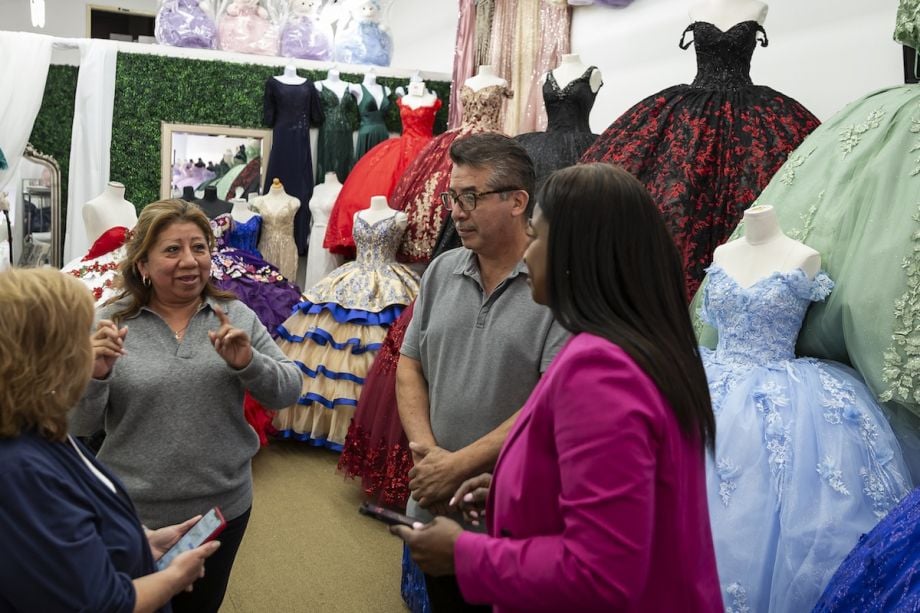
Cesar Rodriguez and his wife, who sell quinceañera dresses at their San Fernando-based shop Analia’s Boutique, meet with members of the non-profit group The Center by Lendistry. (Photo by Scott Pitts)
This story was co-published with AfroLA, nonprofit solutions journalism for Los Angeles told through the lens of the Black community. To republish this article, please contact AfroLA. Subscribe to AfroLA’s newsletter.
In the San Fernando Valley, just north of Los Angeles, temperatures can exceed a scorching 115 degrees. Heat waves are a top concern moving deeper into summer, including for small business owners who pay more to keep spaces cool for customers and staff.
On an April afternoon, members of the L.A.-based nonprofit The Center by Lendistry set out on foot in the city of San Fernando to see what business owners knew about climate resiliency – green strategies that could help them prepare to better handle the heat.
As they step inside Chula Chic, they’re greeted by energetic boutique owner Angelica Bañuelos. She shows off her collection of vibrant handmade dresses and carved leather purses imported from Guadalajara, Mexico.
“This past year has been one of the toughest ones,” she says. Customers are curbing their spending, concerned about an unstable economy, she adds.
“ Everything is going up, so I know that a dress is not a priority as much as food,” Bañuelos says. “You just have to keep going and hope that your business will continue being open as well.”
Tunua Thrash-Ntuk, President and CEO of The Center, asked Bañuelos if she would be interested in eco-friendly strategies like installing low-flow water fixtures, solar panels, drought-resistant landscaping, and starting a recycling and composting program. Bañuelos nods her head to all of them, but she says she doesn’t have cash to spare.
“ To be honest with you, the money that you put aside is to pay the rent or to buy more merchandise,” she says, adding that she would need access to grants to fund these projects.
That’s useful feedback for The Center, which has been collecting interviews with small business owners for months. They’ve learned there’s a lot on business owners’ minds, between the impacts of tariffs raising the cost of goods, raids from the U.S. Immigration and Customs Enforcement scaring customers away and the federal government stripping away funding for support programs.
Climate resiliency doesn’t often make the priority list unless it’s baked into the ethos of the business, but The Center wants business owners to know that making small, seemingly boring changes could cut costs and help them bounce back more easily. The nonprofit recently launched an online resource toolbox, called Main Street Goes Green, to make it easier for small business owners to learn about how to implement and fund climate resilient strategies.
A starting point
Until a few months ago, billions of federal dollars were flowing into climate resilience projects.
“The chaos of funding freezes and the [Department of Government Efficiency] and everything that they’re doing has kind of created a setback in that momentum,” says Miranda Rodriguez, vice president of strategy and operations at The Center.
“Originally, we thought there’s gonna be a bunch of money flooding the market and we want to make sure small businesses are going to be able to take advantage of it – and not just early adopters and equity groups that own commercial real estate,” she sats.
In March, Environmental Protection Agency Administrator Lee Zeldin abruptly canceled more than 400 grants related to environmental justice. That includes more than $250 million earmarked for organizations across California, according to a KQED analysis. Now, projects developing renewable energy infrastructure, climate resilience hubs and programs to empower low-income, under-resourced communities in South L.A. are all in flux.
Rodriguez says climate resilience is still a priority in California, and many local utilities offer rebates and incentives. But often small business owners don’t find out about these programs until the resources have already been exhausted. She hopes the Main Street Goes Green toolbox can help spread more awareness and understanding about where to start.
“The will is there, it’s just how do you do it?” Rodriguez says.
Read the full story at AfroLA.
This post was originally published on Next City.